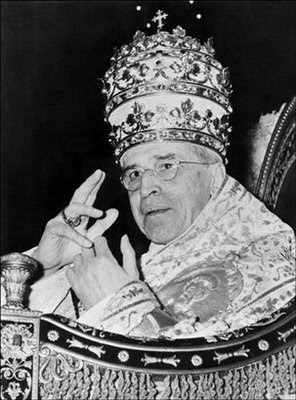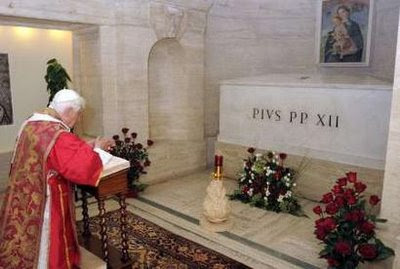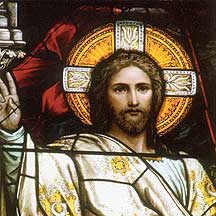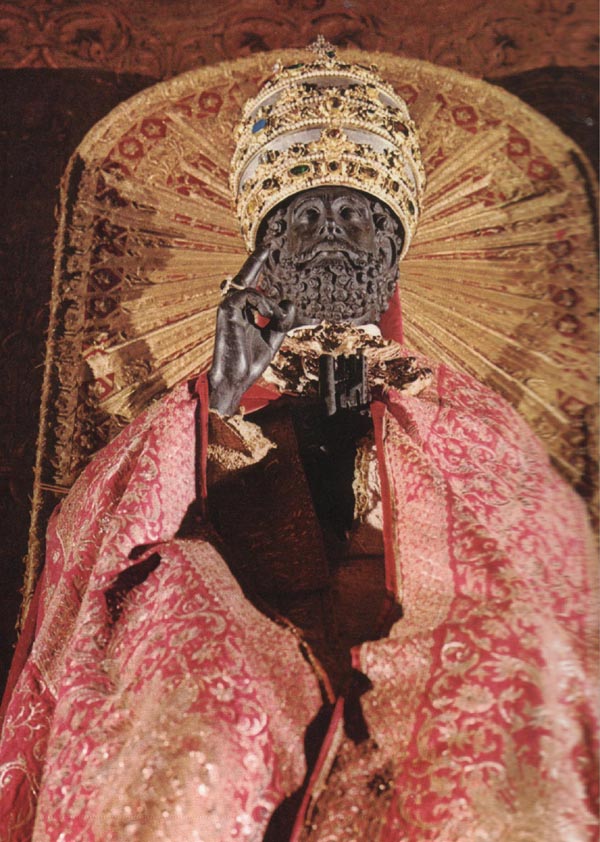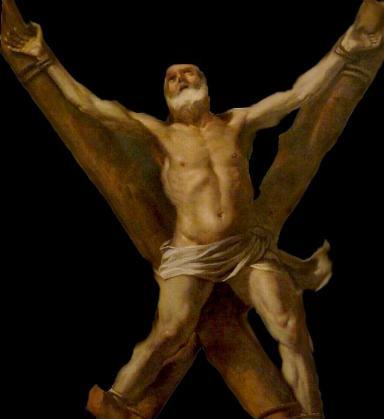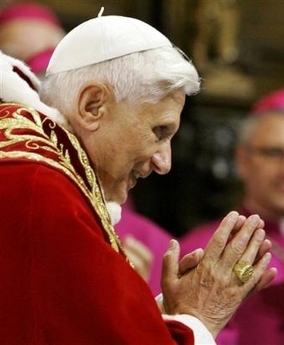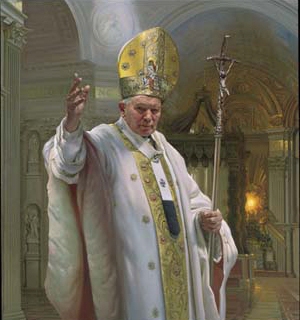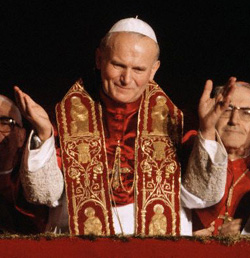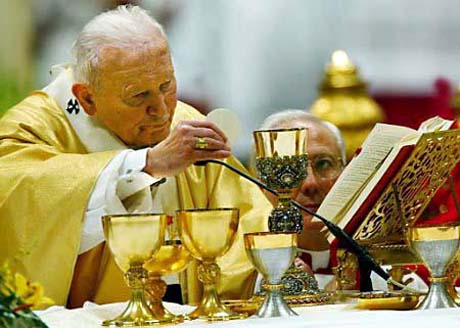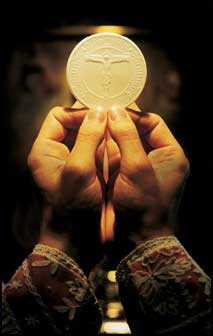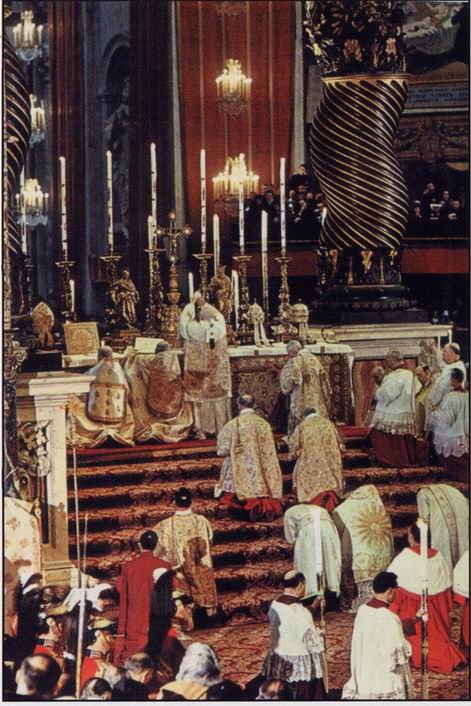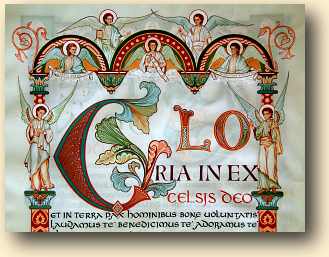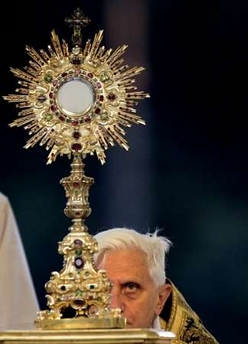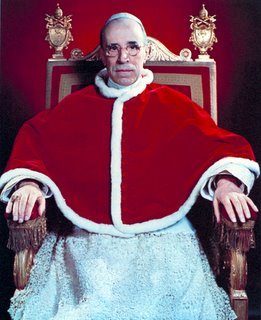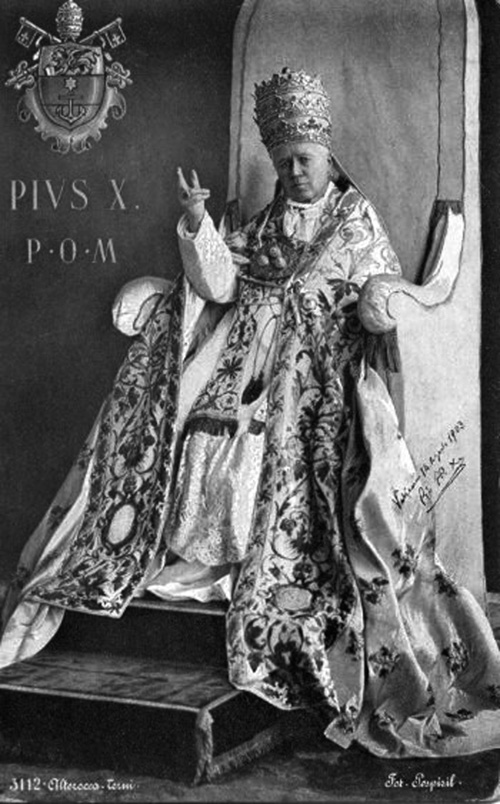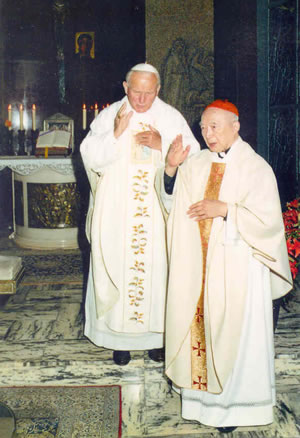
Dear Non-Denom friend,
You have raised many questions regarding the position of the Pope, the Successor to St. Peter in the See of Rome. Before answering the specifics, I’m going to try to provide a brief overview of the scriptural foundations of the Petrine Primacy.
I’m going to try to put this in the simplest terms I know how without compromising the points I want to make.
In Matthew 16, we find the foundation of the Catholic Church’s belief in the Petrine ministry and the primacy of the Apostle Peter in the College of Apostles. Let’s look at this text, Matt 16:13-19.
Now when Jesus came into the district of Caesarea Philippi, He was asking His disciples, "Who do people say that the Son of Man is?"
 And they said, "Some say John the Baptist; and others, Elijah; but still others, Jeremiah, or one of the prophets."
And they said, "Some say John the Baptist; and others, Elijah; but still others, Jeremiah, or one of the prophets."
He said to them, "But who do you say that I am?"
Simon Peter answered, "You are the Christ, the Son of the living God."
And Jesus said to him, "Blessed are you, Simon Barjona, because flesh and blood did not reveal this to you, but My Father who is in heaven.
"I also say to you that you are Peter, and upon this rock I will build My church; and the gates of Hades will not overpower it.
“I will give you the keys of the kingdom of heaven; and whatever you bind on earth shall be bound in heaven, and whatever you loose on earth shall be loosed in heaven."
 Note that Jesus says that Peter's confession is no human conclusion but rather the result of a Divine revelation. It is God the Father Himself who reveals this to Peter. This is something special, to receive a Divine revelation from the Father. But this is a something that would occur again, for example, when Peter received the revelation that all foods are kosher and that Gentiles were to be received into the Church as narrated by the Acts of the Apostles.
Note that Jesus says that Peter's confession is no human conclusion but rather the result of a Divine revelation. It is God the Father Himself who reveals this to Peter. This is something special, to receive a Divine revelation from the Father. But this is a something that would occur again, for example, when Peter received the revelation that all foods are kosher and that Gentiles were to be received into the Church as narrated by the Acts of the Apostles.
Back to the passage. Take note, first of all, of how the passage is structured. After Peter's confession, Our Lord is the speaker and Peter becomes the subject of the discourse. Note the pattern of multiple 'you's' appearing.
Now, what sense can we make of this passage? Briefly, upon Christ’s question of “Who do you say I am” to the disciples, Peter, as is usual, answers on their behalf and offers this confession of faith:
"You are the Christ, the Son of the living God."
To Peter's "You are the Christ", Jesus responds with his own "You are" statement:
“You are Peter (petros, masculine form of the Greek word for rock), and upon this rock (petra, feminine form of the Greek word for rock) I will build My church.”
In the English language, you can’t really see the play of words but it’s much clearer in the Aramaic, Greek, Latin and French.
 καγω δε σοι λεγω οτι συ ει πετρος και επι ταυτη τη πετρα οικοδομησω μου την εκκλησιαν
καγω δε σοι λεγω οτι συ ει πετρος και επι ταυτη τη πετρα οικοδομησω μου την εκκλησιαν
Tu es Petrus, et super hanc petram aedificabo Ecclesiam meam
In the language Jesus spoke, Aramaic, both Peter and rock would have been rendered as kepha (meaning Rock) so He would have said:
“You are Kepha, and upon this kepha I will build My church.”
Pretty clear there. It also comes out in the French:
Et moi, je te dis que tu es Pierre, et que sur cette pierre je bâtirai mon Église
That’s why Peter is called Cephas in parts of the New Testament. It’s a Greek transliteration of the Aramaic kepha which means rock. Our Lord is basically saying to Peter you are Rock and on this Rock I will build my Church.
Our Lord changing Simon's name to Peter is also significant which finds parallels in the Old Testament where God changes the names of individuals to reflect their new vocation. A name change signifies a new task and destiny. Abram became Abraham and Father of Nations. Jacob became Israel and father of the 12 tribes, ever wrestling with God.
Here, Simon son of John is renamed Peter, Cephas, Kepha which means Rock because he is to be the Rock on which Christ would build His Church. Christ, the cornerstone and foundation here becomes the builder, so there's no question of us laying another foundation besides Christ. Because here, it is Christ, the ultimate foundation Himself, who makes Peter as the Rock and foundation of His Church. This rules out the interpretation that Jesus is naming Himself as the Rock-foundation of His Church in this verse.
Now, some people would say that it was Peter's confession that is the Rock. That's true in a sense as Peter cannot be separated from his confession, but is that the primary meaning of the passage?
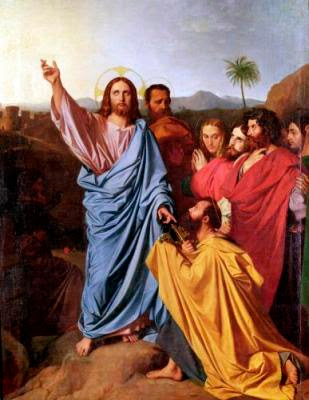 Remember the structure of the passage? From Peter's 'You are the Christ', come Our Lord's responses and promises of:
Remember the structure of the passage? From Peter's 'You are the Christ', come Our Lord's responses and promises of:
"Blessed are you,
"I also say to you
“I will give you
"whatever you bind
"whatever you loose
So, Peter, the confessing Peter, being the subject of Our Lord's response, is clearly the Rock on which Christ's Church is built. When Peter is understood as the Rock, then the following promises make sense.
Only if you're going to make Peter the Rock on which the Church would be built would you give him the keys of the Kingdom of Heaven, for example. And the Power to bind and loose on earth with the promise that whatever he binds and looses on earth would be correspondingly bound and loosed in Heaven.
If Peter were not the Rock, or if Jesus were contrasting Peter as a petros-pebble with the Christ-Rock-Petra, then the passage and the context would not make sense. Why belittle a guy, whose confession Jesus admitted was from Divine revelation, then calling him a pebble and then give this same small insignificant pebble the Keys of the Kingdom and the attendant promises? But this is exactly what some interpreters try to do to downplay the promises made to Peter and to deny the fact that Christ chose to build His Church on Peter.
The promise that the Gates of Hades will not overpower the Church means the Church is indefectible and cannot fall into error or teach error or else the Gates of Hell would, for a time, have prevailed over the Church, violating Jesus’ promise.
 Lets look at the following verse.
Lets look at the following verse.
“Whatever you bind on earth shall be bound in heaven, and whatever you loose on earth shall be loosed in heaven”.
This promise is given individually here, to Peter as Head of the Apostles and later in Matt 18:18, to the whole group of Apostles as a whole. We know Jesus is talking to the disciples from Matt 18:1.
The promise of binding and loosing is a rabbinical term to indicate the power to allow and prohibit, the power to legislate and make laws for the Church. The promise that “whatever you bind on earth shall be bound in heaven, and whatever you loose on earth shall be loosed in heaven” means that neither the holder of the Keys of the Kingdom and the college of Apostles as a whole when they meet in council such as the Council of Jerusalem in Acts 15, can teach error.
What they bind or earth, if it’s error, cannot be bound in Heaven because God cannot sanction error. Therefore, there must be some kind of preventive protection here, preventing Peter or the Apostles as a group from teaching error as truth and binding it on God's people. Then the promise of “whatever you bind on earth shall have been bound in heaven, and whatever you loose on earth shall have been loosed in heaven” holds.
This is the basis of the personal infallibility of the Pope as the Successor of Peter, who when he teaches ex cathedra, as the Pastor and Teacher of all Christians, cannot formally teach error. Thus the Pope must be protected from teaching error by the Holy Spirit. The same infallibility extends to all the Bishops together as the successors of the Apostles. Their dogmatic teaching too, in council, is protected from error. Thus the Council of Jerusalem dared, in Acts 15, to claim the Holy Spirit as the co-author of the decrees contained in their letter to the Churches:
For it seemed good to the Holy Spirit and to us to lay upon you no greater burden than these essentials: (Acts 15:28)

This same protection of the Holy Spirit, active in the Church to this day, is still claimed by all the Councils of the Church, from Nicea to Vatican II and by the Popes from St. Peter to Benedict XVI now gloriously reigning.
Note also that the prerogative of binding and loosing is given to Peter individually in Matt 16:18 and then given to the entire College of Apostles collectively in Matt 18:18? So Peter individually possesses the power to bind and loose while the other Apostles can only do so collectively, with Peter.
We'll next look at the Keys of the Kingdom of Heaven and what it means to possess the Keys. This is uniquely given to Peter alone and not to the Apostles. We'll explore this theme in the coming days.
Land matters: Bishop Tan making a stand on the order to demolish the building constructed without approval on church land at Kampung Ayer Salak, Bukit Rambai, in Malacca yesterday amid a protest by some 100 villagers against the demolition order.
![[Unam Sanctam]](http://2.bp.blogspot.com/_YC87epvokPc/RiIrCqMbS1I/AAAAAAAAChM/N1FQIkmr1PE/s1600/headerdivinemercy.jpg)









































